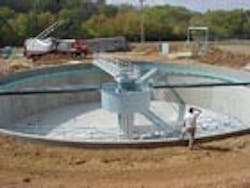Lexington, Ky., Agrees to Major Sewer System Upgrades
The Lexington-Fayette Urban County Government (LFUCG) in Kentucky has agreed to make extensive improvements to its sewer systems, at a cost estimated to exceed $290 million, to eliminate unauthorized overflows of untreated raw sewage and to reduce pollution levels in urban storm water. In addition, LFUCG will pay a civil penalty of $425,000 to the U.S. and implement two federal and two state environmental projects valued at $2.73 million that will provide additional environmental benefits to the Lexington community.
The settlement was recently announced jointly by the U.S. Justice Department, the U.S. Environmental Protection Agency (EPA) and Kentucky's Environmental and Public Protection Cabinet (EPPC). The consent decree, lodged in the U.S. District Court for the Eastern District of Kentucky in Lexington, resolves the joint federal and state complaint filed in November 2006.
"Today's settlement represents a significant commitment by LFUCG to address its aging sewer systems for the long term and bring much-needed protection to human health and the environment in the Lexington area," said Ronald J. Tenpas, assistant attorney general for the Justice Department's Environment and Natural Resources Division.
"Sewage overflows and pollution in urban storm water are major problems that affect water quality in the Southeast and across the entire country," said EPA Regional Administrator Jimmy Palmer. "Bringing systems like LFUCG's into compliance is one of EPA's top enforcement priorities."
"This settlement is an important advance in the protection of water quality in the heart of the Commonwealth," said Robert D. Vance, Kentucky's EPPC secretary. "The Urban County Council should be commended for its action in approving the settlement. I would also like to thank Mayor Newberry for his leadership and his decision to make this resolution a priority of his administration."
LFUCG owns and operates a sanitary sewer system, which includes two major wastewater treatment plants, serving a population of almost 250,000. It also owns and operates a separate storm sewer system that collects urban storm water. Inadequacies in LFUCG's sewer systems' infrastructure and management programs have resulted in unlawful discharges of millions of gallons of untreated sewage, known as sanitary sewer overflows (SSOs), into streams in the Lexington/Fayette County area and increased pollution levels in urban storm water.
These discharges have adversely affected water quality in area streams, including Town Branch, Hickman and Elkhorn Creeks, Cane Run, Wolf Run and Blue Springs Branch. These streams ultimately drain to the Kentucky and Ohio Rivers.
The major features of the consent decree relating to the sanitary sewer system will require LFUCG to identify and quantify recurring discharges of untreated sewage and their causes; evaluate the capacity, design and condition of the components of its sanitary sewer system including pumping stations and treatment plants; develop and implement remedial measures to eliminate recurring SSOs within 11 to 13 years; and improve its management, operation and maintenance programs to prevent future overflows and respond to overflows when they occur.
In addition, the consent decree contains provisions requiring LFUCG to substantially upgrade its programs to reduce pollution in its storm sewer system. For example, LFUCG will establish a funding mechanism for its storm water management programs and adopt ordinances to better address sources of pollution to its storm water system, such as construction sites, developed areas and industrial sites. Moreover, LFUCG will need to meet minimum levels of inspection, screening and monitoring to identify and better address sources of pollution in its storm water system.
According to the settlement, LFUCG will complete two federal supplemental environmental projects. The first project requires LFUCG to restore and preserve approximately eight-tenths of a mile of the Cane Run stream at Cold Stream Park, at a cost of $1 million. The second requires LFUCG to manage storm water runoff at one or more sites in the Lexington area using green infrastructure principles at an estimated cost of about $230,000.
In addition, LFUCG will conduct two state environmental projects. First, LFUCG will eliminate the poorly performing Blue Sky Wastewater Treatment Plant in southeast Fayette County by instead treating that sewage at one of the city's other treatment plants, at an estimated cost of at least $1.3 million. Second, LFUCG will complete a $200,000 evaluation of flooding problems in Lexington and establish a funding mechanism that will raise $30 million over a 10-year period to implement flood control projects.
The proposed consent decree with LFUCG is subject to a 30-day public comment period and final court approval. A copy of the consent decree is available on the Department of Justice Web site at http://www.usdoj.gov/enrd/open.html.
Source: U.S. Department of Justice
